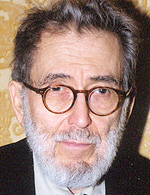A civil libertarian, jazz critic, and self-described troublemaker, Nat Hentoff (1925–2017) spent much of his career defending the First Amendment against a variety of perceived threats. His writings on music, education, ethics, journalism, and civil liberties — particularly free expression — have appeared in dozens of major newspapers and periodicals, including the New York Times and Village Voice.
Additionally, Hentoff has written more than 25 books. Among those regarding free expression are The First Freedom: The Tumultuous History of Free Speech in America (1980), The Day They Came to Arrest the Book (1993), and Living the Bill of Rights: How to Be an Authentic American (1999).
School newspaper scenario sparked Hentoff’s obsession with the First Amendment
Hentoff was born in Boston to Jewish parents who had emigrated from Russia. He graduated from the Boston Latin School in 1941 and attended Northeastern University. He did graduate work at Harvard University and in 1950 was a Fulbright fellow at the Sorbonne in Paris. His first journalism job came at age 15 with a brief stint at the Boston City Reporter, where he dug up news on city scandals. Later, while at Northeastern, he worked on the student newspaper.
As Hentoff explained in his memoir Boston Boy (1986), his “obsession” for the First Amendment was sparked when the university’s president forbade Hentoff and his staff to report on the school’s board of trustees. The young editor and most of his staff resigned in protest.
Hentoff resigned from the ACLU over differing ideals
A long-time member of the American Civil Liberties Union (ACLU), Hentoff has not always agreed with stereotypically liberal causes. For example, he opposes capital punishment as well as abortion, and he resigned from the ACLU in 1995 when the organization opposed the mandatory identification of HIV-infected newborns.
Hentoff has criticized campus speech codes
Hentoff has vehemently criticized campus speech codes as a flagrant affront to the First Amendment. He served on the steering committee of the Reporters Committee for Freedom of the Press and was on the board of advisers for the Foundation for Individual Rights in Education. He died in his Manhattan home on January 7, 2017.
This article was originally published in 2009. Dr. Neil Ralston worked as a reporter and editor for 10 years before beginning a career as a journalism teacher at the college level in 1989. His Ph.D. dissertation focused on the First Amendment attitudes and knowledge of high school students. From 2007 to 2013, he served as a vice president on the board of directors of the Society of Professional Journalists where he worked with students and advisers at college media outlets who faced censorship attempts. He now teaches at Lindenwood University in St. Charles, Missouri.

